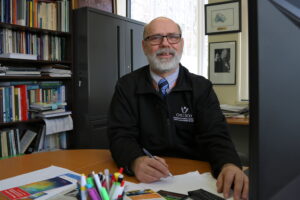
Invisible Children’s Kony 2012 video and campaign quickly received an unprecedented surge of attention after the video’s release on March 5, 2012, attracting 86 million Youtube views by the end of the month. Yet, despite its overwhelming popularity the campaign and its front man, Invisible Children founder and director Jason Russell, quickly became the subjects of widespread criticism by sceptics who noticed an array of problems in the particulars of the campaign’s approach to capturing Joseph Kony.
As head of the Ugandan guerilla group Lord’s Resistance Army, Kony has notoriously built up his militia by abducting young children and forcing them, in the boys’ cases, to fight for the LRA after being made to kill their own family members, and in the girls’ cases, into sexual slavery. Kony was indicted by the International Criminal Court in 2005 for war crimes and crimes against humanity. With the Kony 2012 video Russell and his organization aimed to shine the spotlight on the LRA’s leader and his crimes and to “make Joseph Kony famous: not to celebrate him, but to raise support for his arrest and set a precedent for international justice.” While most viewers could easily identify with the basic premise of opposing Kony and the LRA, a host of problematic issues came to light very quickly which caused many to doubt the credibility of the particular approach advocated, as well as the Invisible Children foundation and even Russell himself.
As Russell explains in the video, the campaign’s purpose is to encourage people to lobby government to provide for military resources aimed at capturing Kony in order to bring him to trial. Prior to the film’s release, Russell and Invisible Children helped convince the US government to send 100 military advisors to coordinate with the Ugandan army in attempting to bring about Kony’s capture. Kony 2012 warns that such resources could easily be withdrawn if the public does not increase its support for them. The essence of the campaign is encapsulated in the following brief statement made by Russell during the film:
In order for Kony to be arrested this year, the Ugandan military has to find him. In order for them to find him, they need the technology and training to find him in the vast jungle. That’s where the American advisors come in. But in order for the American advisors to be there, the US government has to deploy them. They’ve done that, but if the government doesn’t believe that the people care about arresting Kony, the mission will be canceled. In order for people to care, they have to know, and they will only know if Kony’s name is everywhere.
In short, the campaign seeks to raise awareness of Kony and his crimes and make him a household name so that the Obama administration and presumably other governments as well, recognize an incentive to maintain or initiate assistance to Ugandan military forces seeking Kony’s capture. With this objective in mind, Russell and Invisible Children concocted the “Cover the Night” campaign, calling on everyone watching the film to participate in putting up Kony 2012 posters all over their neighbourhoods and cities after dark on April 20
th. Tragically, Russell’s incessant preaching about a world in which viral videos can change history for the better proved wildly off the mark, as the results of the Cover the Night campaign were pitiful compared to the staggering amount of attention paid to the video itself. While Russell fantasized about waking up on April 21
st to a worldwide collage of Kony posters and newscasts proclaiming him the new messiah of the universe, the actual outcome on that morning was a world very much the same as it had been the previous day, with most cities and neighbourhoods exhibiting little or no evidence of the Cover the Night campaign. More than 20,000 Facebook users pledged to attend “Cover the Night” in downtown Vancouver, yet only 17 people actually met up and participated downtown that night. Similar outcomes characterized major US and European cities. The question is why did Cover the Night fail so miserably despite the Kony 2012 video’s incredible popularity?
Above all, it seems various sources of criticism against the Kony 2012 campaign as a whole incited widespread scepticism which significantly undermined the credibility of the campaign and the people behind it. The most glaring fault observed by critics was that the campaign was clearly oversimplified and unsophisticated in its approach to a complex problem. The premise of the campaign is that we can all change the world for the better simply by raising awareness. This is a fundamentally childish view of international politics and may have the benefit of making armchair activists feel good about themselves for ‘making a difference’, but achieves little in the way of actually solving the problems it claims to be tackling. ‘Making Kony famous’ will most likely do nothing whatsoever to stop him.
Russell and Invisible Children might respond that awareness is only the beginning; that it is merely the first step which will necessarily lead to action. But even if we accept this to be true, which seems quite absurd if the Cover the Night campaign is any proof, we must still ask whether the action being advocated here is appropriate. Kony 2012 assumes the best course of action is to provide military assistance to the Ugandan army, yet it fails to mention that the Ugandan military makes plenty of its own appearances on human rights organizations’ lists of human rights abuses. According to Human Rights Watch, it regularly engages in acts of torture, rape, and looting, and frequently uses lethal force against political protestors.
In addition to this appalling ethical conduct, when the US sent a smaller team of military advisors to Uganda in 2008 to help coordinate an offensive against the LRA, the Ugandan forces reportedly ignored the directives of American advisors and ultimately allowed Kony to escape and subsequently slaughter hundreds of civilians, which raises questions about the willingness and/or ability of Ugandan forces to carry out US advisors’ commands. It is also well known that the LRA is no longer primarily active in Uganda, but more predominantly in other countries in the region such as the Democratic Republic of Congo, Sudan, and the Central African Republic. Given the questionable behaviour of the Ugandan forces, it doesn’t make much sense to promote a military effort which would have them chasing Kony across state borders in a region already plagued with conflict and known for rapid escalation of hostilities. Even if Russell’s adorable notion of online activism translating into massive real-world action were true, the ‘action’ Russell pursues is to empower the corrupt, callous and incompetent Ugandan military on a wild goose chase across an extremely hostile region to fight against a militia consisting of the very victimized children he supposedly set out to protect.
Sadly, the naivety of the campaign’s approach was not the only issue spotted by critics. Another hot topic was Invisible Children’s allocation of donation money. With revenues of $13.8 million last year, Invisible children spent $8.9 million on marketing, management and the production of videos, and reserved only $3.3 million for services and programs in Central Africa. Invisible Children spends most of their revenues financing awareness, which does nothing to stop Kony. This leaves only a small percentage left to actually help people in the regions afflicted by his atrocities.
As if Russell hadn’t yet provided enough material for his many critics, on March 15
th he was detained by San Diego police for running around naked in the street, blocking traffic, and purportedly masturbating in public, according to one of the many callers alerting the police at the time. Some undoubtedly found this a shocking turn of events, while for others perhaps it was more like fitting together the last pieces of a puzzle: suddenly it became all too clear that such a half-baked campaign could only be the product of a simple-minded (and apparently deranged) individual like Jason Russell. In the end the “one thing we can all agree on” (the campaign slogan) turned out to be not quite what Russell had imagined: that to follow the course of action advocated by the Kony 2012 campaign would be about as intelligent as a grown man publicly masturbating in the street.
 Invisible Children’s Kony 2012 video and campaign quickly received an unprecedented surge of attention after the video’s release on March 5, 2012, attracting 86 million Youtube views by the end of the month. Yet, despite its overwhelming popularity the campaign and its front man, Invisible Children founder and director Jason Russell, quickly became the subjects of widespread criticism by sceptics who noticed an array of problems in the particulars of the campaign’s approach to capturing Joseph Kony.
As head of the Ugandan guerilla group Lord’s Resistance Army, Kony has notoriously built up his militia by abducting young children and forcing them, in the boys’ cases, to fight for the LRA after being made to kill their own family members, and in the girls’ cases, into sexual slavery. Kony was indicted by the International Criminal Court in 2005 for war crimes and crimes against humanity. With the Kony 2012 video Russell and his organization aimed to shine the spotlight on the LRA’s leader and his crimes and to “make Joseph Kony famous: not to celebrate him, but to raise support for his arrest and set a precedent for international justice.” While most viewers could easily identify with the basic premise of opposing Kony and the LRA, a host of problematic issues came to light very quickly which caused many to doubt the credibility of the particular approach advocated, as well as the Invisible Children foundation and even Russell himself.
As Russell explains in the video, the campaign’s purpose is to encourage people to lobby government to provide for military resources aimed at capturing Kony in order to bring him to trial. Prior to the film’s release, Russell and Invisible Children helped convince the US government to send 100 military advisors to coordinate with the Ugandan army in attempting to bring about Kony’s capture. Kony 2012 warns that such resources could easily be withdrawn if the public does not increase its support for them. The essence of the campaign is encapsulated in the following brief statement made by Russell during the film:
Invisible Children’s Kony 2012 video and campaign quickly received an unprecedented surge of attention after the video’s release on March 5, 2012, attracting 86 million Youtube views by the end of the month. Yet, despite its overwhelming popularity the campaign and its front man, Invisible Children founder and director Jason Russell, quickly became the subjects of widespread criticism by sceptics who noticed an array of problems in the particulars of the campaign’s approach to capturing Joseph Kony.
As head of the Ugandan guerilla group Lord’s Resistance Army, Kony has notoriously built up his militia by abducting young children and forcing them, in the boys’ cases, to fight for the LRA after being made to kill their own family members, and in the girls’ cases, into sexual slavery. Kony was indicted by the International Criminal Court in 2005 for war crimes and crimes against humanity. With the Kony 2012 video Russell and his organization aimed to shine the spotlight on the LRA’s leader and his crimes and to “make Joseph Kony famous: not to celebrate him, but to raise support for his arrest and set a precedent for international justice.” While most viewers could easily identify with the basic premise of opposing Kony and the LRA, a host of problematic issues came to light very quickly which caused many to doubt the credibility of the particular approach advocated, as well as the Invisible Children foundation and even Russell himself.
As Russell explains in the video, the campaign’s purpose is to encourage people to lobby government to provide for military resources aimed at capturing Kony in order to bring him to trial. Prior to the film’s release, Russell and Invisible Children helped convince the US government to send 100 military advisors to coordinate with the Ugandan army in attempting to bring about Kony’s capture. Kony 2012 warns that such resources could easily be withdrawn if the public does not increase its support for them. The essence of the campaign is encapsulated in the following brief statement made by Russell during the film:









